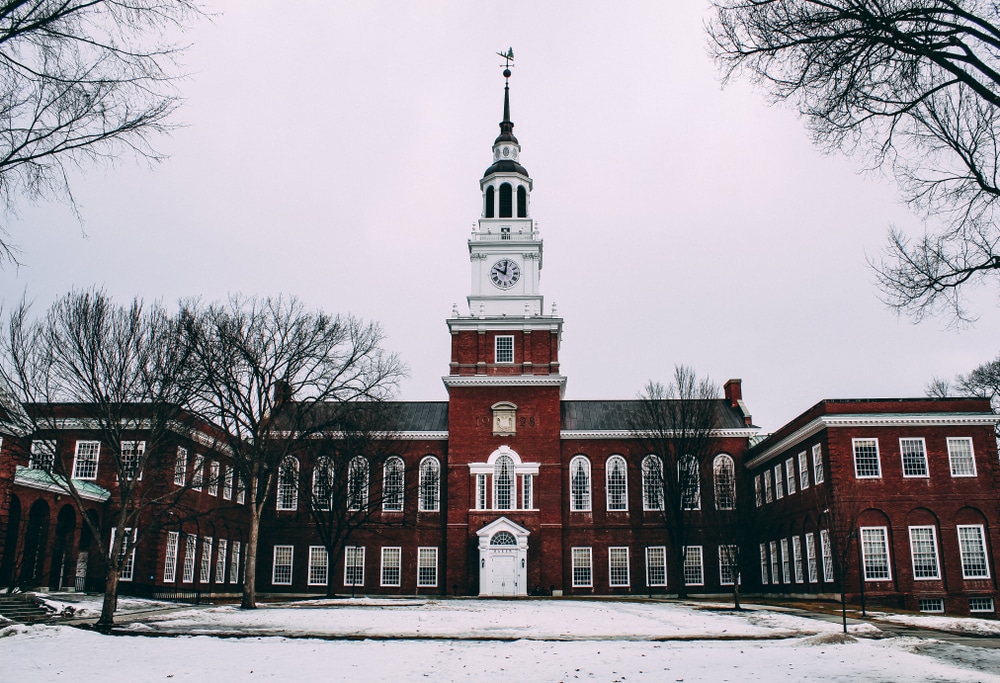Dartmouth vs Wisconsin-Madison: A Comprehensive Analysis
Choosing the right university is a daunting task that requires careful consideration of a variety of factors. Among the most important considerations are location, history, campus life, academics, admission requirements, student body, cost of attendance, financial aid, alumni networks, athletics, research opportunities, career services, campus tours, student reviews, and conclusions. In this article, we will compare Dartmouth vs Wisconsin-Madison to help you decide which university is right for you.
Location: Where are Dartmouth and Wisconsin-Madison located?
Dartmouth is a private Ivy League research university located in Hanover, New Hampshire, United States. Wisconsin-Madison is a public research university located in Madison, Wisconsin, United States. Both universities are located in small college towns that offer a tight-knit community to their students. While Dartmouth is located in a scenic, wooded area, Wisconsin-Madison is located in an urban area, giving students a wider range of social activities.
Additionally, Hanover, New Hampshire is located in the northeastern region of the United States, close to the border of Vermont. Madison, Wisconsin is located in the Midwest region of the United States, and is the capital city of Wisconsin. Both locations offer unique opportunities for outdoor activities, with Dartmouth being close to the White Mountains and Wisconsin-Madison being situated near several lakes and parks.
History: A brief history of Dartmouth and Wisconsin-Madison
Dartmouth was founded in 1769, making it the ninth-oldest higher education institution in the United States. The University’s original mission was to educate Native Americans. Wisconsin-Madison was founded in 1848 and is one of the oldest public universities in the country. It was also the first American university to establish a department of agriculture.
Both Dartmouth and Wisconsin-Madison have a rich history of academic excellence and innovation. Dartmouth has produced many notable alumni, including Daniel Webster, Robert Frost, and Mindy Kaling. Wisconsin-Madison, on the other hand, has been a pioneer in research and development, with many groundbreaking discoveries in fields such as medicine, engineering, and environmental science. Today, both universities continue to uphold their legacies of academic excellence and continue to shape the future of higher education in the United States.
Campus Life: What is campus life like at Dartmouth and Wisconsin-Madison?
The campus life at Dartmouth is characterized by small class sizes and a strong sense of community. The cozy, Ivy League campus offers a diverse array of extracurricular opportunities, including fraternities, sororities, and athletic teams. Wisconsin-Madison’s large campus offers a similar number of student organizations, including dozens of fraternities, sororities, and club sports. The campus is also known for its vibrant arts scene, with theater and dance performances throughout the year.
However, there are some notable differences between the campus life at Dartmouth and Wisconsin-Madison. Dartmouth’s campus is located in a small town in New Hampshire, which offers a tight-knit community feel and a quieter atmosphere. In contrast, Wisconsin-Madison’s campus is located in the heart of a bustling city, which provides students with a more urban experience and access to a wider range of cultural events and activities. Additionally, Wisconsin-Madison is known for its strong emphasis on research, with many opportunities for students to get involved in cutting-edge research projects alongside faculty members.
Dartmouth vs Wisconsin-Madison: Academics
Dartmouth and Wisconsin-Madison offer top-tier academic programs in a variety of fields. Dartmouth is known for its strong liberal arts focus, offering degrees in the humanities, social sciences, and natural sciences. Wisconsin-Madison is known for its research facilities and is home to one of the largest research libraries in North America. The university also offers a range of undergraduate and graduate degrees in the humanities, social sciences, and natural sciences.
However, there are some differences in the academic programs offered by these two universities. Dartmouth has a smaller student body and a more intimate learning environment, with a student-to-faculty ratio of 7:1. This allows for more personalized attention and mentorship opportunities for students. On the other hand, Wisconsin-Madison has a larger student body and offers a wider range of academic programs, including professional programs in law, business, and engineering.
Admission Requirements: What are the admission requirements for Dartmouth and Wisconsin-Madison?
The admission requirements for both universities are similar, with both institutions requiring standardized test scores, essays, letters of recommendation, and transcripts. In addition, Dartmouth requires an interview, while Wisconsin-Madison does not. The application process for both universities is competitive, with acceptance rates averaging around 7-8%.
However, there are some differences in the admission requirements for specific programs within each university. For example, Dartmouth’s engineering program requires additional math and science coursework, while Wisconsin-Madison’s business program requires prior coursework in economics and accounting. It is important for prospective students to carefully review the admission requirements for their desired program before applying.
Furthermore, both universities offer various opportunities for students to showcase their talents and achievements beyond the standard application requirements. Dartmouth encourages applicants to submit a creative portfolio or participate in an arts supplement program, while Wisconsin-Madison offers the option to submit a video essay or participate in an honors program. These additional opportunities can help applicants stand out in the competitive application process.
Student Body: What is the student body like at Dartmouth and Wisconsin-Madison?
Dartmouth has a small student body of around 6,000 undergraduate and graduate students. The university’s student body is known for its collaborative, community-oriented spirit. Wisconsin-Madison, on the other hand, has a much larger student body of around 45,000 undergraduate and graduate students. The university’s student body is known for its diversity and inclusivity, with students from all over the world.
Despite its small size, Dartmouth’s student body is incredibly diverse, with students from all 50 states and over 70 countries. The university also has a strong commitment to undergraduate education, with a student-to-faculty ratio of 7:1. This allows for personalized attention and mentorship opportunities for students.
Wisconsin-Madison’s large student body offers a wide range of opportunities for students to get involved in various clubs, organizations, and activities. The university also has a strong research focus, with over $1 billion in annual research expenditures. This provides students with unique opportunities to work alongside faculty on cutting-edge research projects.
Dartmouth vs Wisconsin-Madison: Cost of Attendance
The cost of attending Dartmouth is higher than Wisconsin-Madison due to its status as a private institution. The average cost of tuition and fees at Dartmouth is around $55,000 per year, while the average cost of tuition and fees at Wisconsin-Madison is around $10,000 per year for in-state students and $36,000 per year for out-of-state students. However, both universities offer extensive financial aid programs to help students afford their education.
It is important to note that the cost of attendance at both universities goes beyond just tuition and fees. Students must also consider the cost of room and board, textbooks, and other expenses. At Dartmouth, the estimated cost of attendance for the 2021-2022 academic year is $78,000, while at Wisconsin-Madison, it is estimated to be around $28,000 for in-state students and $51,000 for out-of-state students.
Despite the higher cost of attendance at Dartmouth, the university boasts a strong alumni network and a high return on investment for graduates. According to PayScale, the median salary for Dartmouth alumni with at least 10 years of experience is around $150,000 per year, while the median salary for Wisconsin-Madison alumni with the same level of experience is around $90,000 per year.
Dartmouth vs Wisconsin-Madison: Financial Aid
Dartmouth and Wisconsin-Madison both offer extensive financial aid programs to help students afford their education. Dartmouth offers need-based financial aid, with 50% of students receiving aid. Wisconsin-Madison offers a range of merit-based and need-based scholarships, grants, and loans to help students pay for their education.
At Dartmouth, students can also apply for work-study programs, which allow them to work part-time on campus to earn money towards their education. Additionally, Dartmouth offers a loan-free program for students with family incomes below a certain threshold, ensuring that students can graduate without significant debt.
Wisconsin-Madison also offers a variety of resources to help students manage their finances, including financial literacy workshops and counseling services. The university also has partnerships with local businesses to provide students with discounts on essential items like textbooks and groceries.
Alumni Network: How does the alumni network of Dartmouth compare to Wisconsin-Madison?
Dartmouth and Wisconsin-Madison both have extensive alumni networks that offer valuable resources to students after they graduate. Dartmouth’s alumni network is particularly strong in fields such as business and finance, while Wisconsin-Madison’s alumni network is well-connected in fields such as engineering and technology.
However, Dartmouth’s alumni network also offers a wide range of opportunities for students interested in the arts and humanities. Many alumni are involved in the entertainment industry and can provide valuable connections and advice to students pursuing careers in fields such as film, theater, and music.
On the other hand, Wisconsin-Madison’s alumni network has a strong presence in the healthcare industry. Many alumni are doctors, nurses, and healthcare administrators who can offer guidance and support to students interested in pursuing careers in healthcare. Additionally, the university has a strong research program in the field of medicine, which provides students with opportunities to work alongside alumni who are leading experts in their respective fields.
Athletics: Which university has a better athletics program, Dartmouth or Wisconsin-Madison?
Dartmouth has a strong athletics program, offering varsity teams in 34 sports. The university’s football team is particularly well-known, with a long history of success. Wisconsin-Madison has a larger athletics program, offering varsity teams in 23 sports. The university’s football team is also well-known, with a large and supportive fan base.
However, while both universities have successful football programs, Dartmouth has a strong tradition in winter sports such as skiing and ice hockey. The Dartmouth ski team has won 31 national championships, while the ice hockey team has made it to the NCAA tournament 19 times. Wisconsin-Madison, on the other hand, has a strong tradition in basketball, with the men’s team winning the NCAA championship in 1941 and 2021.
Research Opportunities: What kind of research opportunities are available at Dartmouth and Wisconsin-Madison?
Dartmouth and Wisconsin-Madison both have extensive research facilities and offer numerous research opportunities for undergraduate and graduate students. Dartmouth has particularly strong programs in neuroscience, engineering, and public policy. Wisconsin-Madison has particularly strong programs in agriculture, ecology, and engineering.
Additionally, both universities have research opportunities in a wide range of fields, including but not limited to biology, chemistry, physics, computer science, and social sciences. Students can work with faculty members on ongoing research projects or pursue their own independent research with the support of the university. These research opportunities provide valuable hands-on experience and can lead to publications, presentations, and other professional opportunities.
Career Services: How do the career services at Dartmouth vs Wisconsin-Madison compare?
Dartmouth and Wisconsin-Madison both offer extensive career services to help students find internships and jobs after they graduate. Dartmouth’s career services office is particularly well-known for its focus on entrepreneurship and social impact. Wisconsin-Madison’s career services office is particularly well-known for its connections in the Midwest business community.
Additionally, both universities offer career fairs and networking events throughout the year to connect students with potential employers. Dartmouth’s career fair is known for attracting a diverse range of companies, including startups and non-profits, while Wisconsin-Madison’s career fair is known for its strong representation from large corporations in the Midwest region.
Dartmouth vs Wisconsin-Madison: Campus Tour
You can take a virtual tour of Dartmouth and Wisconsin-Madison on their respective websites to get a feel for each campus and their facilities.
Virtual tours are a great way to explore the campuses of Dartmouth and Wisconsin-Madison from the comfort of your own home. You can see the different buildings, dormitories, and recreational areas that each campus has to offer. Additionally, virtual tours often include information about the history and culture of the university, giving you a deeper understanding of the institution. So, take advantage of these resources to help you make an informed decision about which university is the best fit for you.
Dartmouth vs Wisconsin-Madison: Student Reviews
Reading reviews from current students and alumni of Dartmouth and Wisconsin-Madison can also be valuable in helping you make your decision. Online resources such as Niche and College Confidential offer extensive student reviews and insights.
It’s important to keep in mind that while student reviews can be helpful, they should be taken with a grain of salt. Everyone’s experience is unique and what works for one person may not work for another. It’s also important to consider the source of the review and whether or not their priorities and values align with your own. That being said, reading a variety of reviews can give you a better understanding of the overall culture and atmosphere of each university.
Conclusion: Which university is the best fit for you based on your preferences and goals?
Choosing between Dartmouth and Wisconsin-Madison ultimately depends on your individual preferences and goals. Dartmouth offers a more intimate academic experience with a strong emphasis on the liberal arts. Wisconsin-Madison offers a larger and more diverse community with extensive research opportunities. Both universities offer excellent academic programs, robust student life, and strong career support. It’s up to you to decide which university is the best fit for you based on your individual needs and goals.
It’s important to consider factors beyond academics when making your decision. Location, campus culture, and extracurricular activities can all play a significant role in your overall college experience. Dartmouth is located in a small town in New Hampshire, while Wisconsin-Madison is situated in a bustling college town in the Midwest. Dartmouth has a strong focus on outdoor activities and a close-knit community, while Wisconsin-Madison has a lively sports culture and a diverse range of student organizations. Take the time to research and visit both campuses to get a better sense of which university aligns with your personal values and interests.
How AdmissionSight Can Help You With College Admissions
AdmissionSight is a college consulting firm that provides personalized assistance to students throughout the college admissions process. Here are some ways that AdmissionSight can help you:
Admissions strategy: AdmissionSight can help you develop a strategic plan for your college application process. Our professional consultants can assist with identifying schools that are a good fit for your academic, extracurricular, and personal goals and help you plan and prioritize your application strategy.
Application review: AdmissionSight can review your application and provide feedback on how to improve it. We can offer suggestions on making your application stand out and highlighting your strengths and unique qualities.
Essay coaching: AdmissionSight can help you craft compelling essays that showcase your personality, goals, and achievements. We can guide you through the essay writing process and provide feedback on your drafts to help you refine your writing.
Interview preparation: AdmissionSight can provide interview coaching to help you feel confident and prepared for college interviews. Our experts can offer tips on how to present yourself professionally and how to answer common interview questions.
Extracurricular planning: AdmissionSight can help you plan and develop your extracurricular activities to make them more impactful and meaningful. We can suggest activities that align with your interests and goals and provide guidance on demonstrating your leadership and initiative.
Overall, AdmissionSight can provide valuable guidance and support throughout the college admissions process to help you maximize your chances of getting accepted into the college of your choice.
With a high success rate of over 75%, we have built a strong network in the past decade. Book an initial consultation today, free of charge!










































